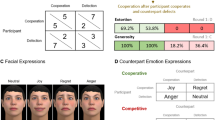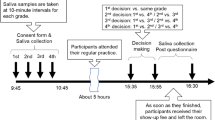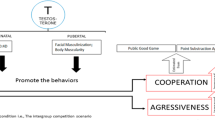Abstract
Replying to J. van Honk, E. R. Montoya, P. A. Bos, M. van Vugt & D. Terburg Nature 485 10.1038/nature11136 (2012)
van Honk and colleagues have taken our findings on the role of testosterone in ultimatum game bargaining1 a step forward by showing that the hormone has important prosocial effects beyond the ultimatum game by increasing cooperation in the public goods game (PGG)2. In contrast to the ultimatum game, participants in the PGG decide simultaneously about their cooperation levels and are not confronted with a rejection threat from other participants, suggesting a much more universal effect of testosterone on prosociality than revealed by our study1. As the PGG captures a large class of evolutionarily and contemporaneously important situations, their findings are of great interest, and considerably extend our knowledge about the causal effect of testosterone on social behaviour. In addition, their results raise intriguing questions regarding the motivational and biological mechanisms through which testosterone increased cooperation levels, suggesting that the study will trigger further important experiments.
This is a preview of subscription content, access via your institution
Access options
Subscribe to this journal
Receive 51 print issues and online access
$199.00 per year
only $3.90 per issue
Buy this article
- Purchase on Springer Link
- Instant access to full article PDF
Prices may be subject to local taxes which are calculated during checkout
Similar content being viewed by others
References
Eisenegger, C., Naef, M., Snozzi, R., Heinrichs, M. & Fehr, E. Prejudice and truth about the effect of testosterone on human bargaining behaviour. Nature 463, 356–359 (2010)
van Honk, J., Montoya, E. R., Bos, P. A., van Vugt, M. & Terburg, D. New evidence on testosterone and cooperation. Nature 485, http://dx.doi.org/10.1038/nature11136 (2012)
Mazur, A. & Booth, A. Testosterone and dominance in men. Behav. Brain Sci. 21, 353–397 (1998)
Eisenegger, C., Haushofer, J. & Fehr, E. The role of testosterone in social interaction. Trends Cogn. Sci. 15, 263–271 (2011)
Hardy, C. L. & Van Vugt, M. Nice guys finish first: the competitive altruism hypothesis. Pers. Soc. Psychol. Bull. 32, 1402–1413 (2006)
Willer, R. Groups reward individual sacrifice: the status solution to the collective action problem. Am. Sociol. Rev. 74, 23–43 (2009)
Zheng, Z. & Cohn, M. J. Developmental basis of sexually dimorphic digit ratios. Proc. Natl Acad. Sci. USA 108, 16289–16294 (2011)
van Honk, J. et al. Testosterone administration impairs cognitive empathy in women depending on second-to-fourth digit ratio. Proc. Natl Acad. Sci. USA 108, 3448–3452 (2011)
Author information
Authors and Affiliations
Corresponding author
Rights and permissions
About this article
Cite this article
Eisenegger, C., Naef, M., Snozzi, R. et al. Eisenegger et al. reply. Nature 485, E5–E6 (2012). https://doi.org/10.1038/nature11137
Issue Date:
DOI: https://doi.org/10.1038/nature11137
Comments
By submitting a comment you agree to abide by our Terms and Community Guidelines. If you find something abusive or that does not comply with our terms or guidelines please flag it as inappropriate.



